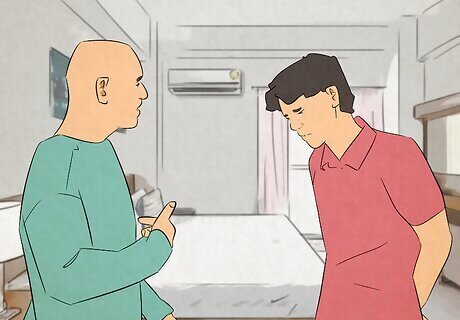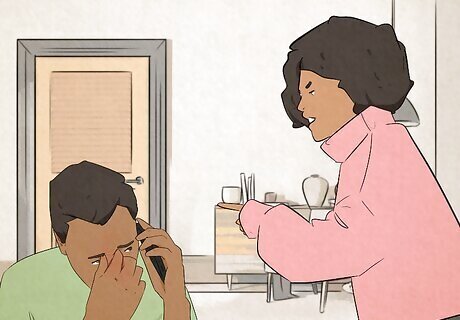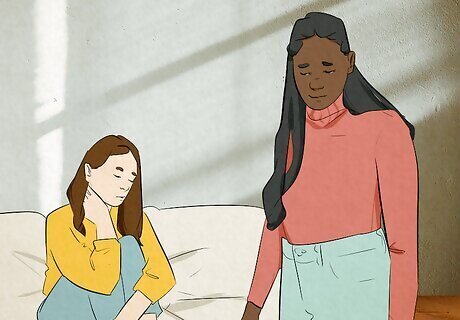
views
X
Trustworthy Source
Cleveland Clinic
Educational website from one of the world's leading hospitals
Go to source
We talked to clinical therapist Rebecca Tenzer to learn the strongest signs of trauma bonding, as well as what you can do to stop the cycle if you notice these signs in your own relationship.
You feel an intense and overwhelming attraction.

Your partner has swept you off of your feet. You felt a powerful attraction to your partner when the two of you first met, an attraction that it seems has only strengthened. They love and care for you exactly the way you need to be loved and cared for. What it looks like: Excessive compliments, romantic gestures, giving gifts, and lots of physical affection. What you can do: Try to slow the relationship down. Limit how often you see your partner and avoid making any big changes that would accelerate the relationship (such as moving in together).
Your partner alternates between being loving and abusive.

The good times are so good you may be convinced they outweigh the bad. Clinical therapist Rebecca Tenzer notes that when an "episode of harm or abuse takes place, there's then a period of romanticizing, or the honeymoon stage." When your partner is being loving and kind, they seem to be the kindest, most loving person you've ever known. This often allows you to excuse the abusive periods or write them off. You might tell yourself the abuse doesn't reflect who your partner really is. What it looks like: Abuse followed by an apology, and a seemingly heartfelt attempt to "do better" followed by a relapse into abuse. What you can do: Keep a journal and write detailed entries during the abusive periods. Go back and read them when your partner is in the love-bombing phase of the cycle to remind yourself who they really are.
There is a power imbalance between you and your partner.

The abusive partner has power over the victim. For some trauma-bonded couples, this power is literal—but it can also be purely psychological. You might feel as though you can't do anything without talking to your partner first, or you might avoid making decisions or doing things for fear of triggering your partner's abusive side. Clinical therapist Rebecca Tenzer notes that "the person who is the victim often becomes dependent on the relationship with their abuser." What it looks like: The abusive partner might have financial power because they make more money than the victim, or the abusive partner might have strong preferences and fly off the handle when things don't go their way. What you can do: Start taking control in small areas of your life. Make decisions for yourself without thinking about what your partner would want you to do.
You defend your partner and justify their abusive actions.

Because you adore your partner you tend to ignore their red flags. You might simply believe that there's a good reason your partner acted the way they did—they were tired or overwhelmed, for example. You'll also internalize this thought process, believing that if you were only a better partner, they wouldn't treat you this way. Clinical therapist Rebecca Tenzer adds that "a lot of times those red flags that people might initially see might be disguised as 'Oh, the person really cares about me. They want to look out for my best interest. They're trying to protect me from the outside world.'" What it looks like: You say that your partner wouldn't have acted abusively if you hadn't triggered it, you believe that you deserve to be treated how your partner treats you, and you tell friends or family that your partner "isn't that bad" or that they just don't understand. What you can do: Recognize that only your partner is responsible for their actions. Even if you did something that triggered a reaction, they made the choice of how they would react.
Your partner isolates you from your support system.

Having fewer people around you gives your partner more control. It's likely that your partner understands that your close friends and family members are likely to call your attention to their abusive behavior. Making you feel guilty about being with your friends and family enables them to be the only voice in your life that will explain reality to you. Clinical therapist Rebecca Tenzer notes that this can start fairly early in the relationship, where "things might seem a little strange at first, like maybe there's a little bit of your partner trying to isolate you [or] keep you away from your family and friends." What it looks like: Your partner complains about your friends or insists they're a bad influence on you, you no longer do things socially that you used to do all the time, and your friends or family complain that they never see you. Tenzer also mentions that your partner "might even start to kind of brainwash you to believe that your family or friends are not good for you or causing you harm." What you can do: Reach out to close friends or family members individually and explain what has happened. Make plans to meet up with them, if you can, at a time when your partner will be busy.
You feel as though you're constantly walking on eggshells.

Pleasing your partner offers a key to unlock more of the good times. This relates back to the cycle of abuse—you come to believe that if only you don't trigger your partner's abusive streak, they'll always be the ideal partner. The only problem is that you're never entirely sure what will trigger them, so you're always overly cautious around them. What it looks like: You never saying "no" to your partner, you put your partner's likes and interests above your own, and you bend over backward to keep your partner happy. What you can do: Tell yourself that you aren't responsible for your partner's reactions. Set boundaries with your partner regarding the types of reactions you'll tolerate.
You have low self-esteem.

You could come to believe you are nothing without your partner. Your partner's emotional manipulation strategies may gradually erode your self-esteem until you have next to none left. You're convinced that all of the insults and criticisms that your partner hurls at you are true and you don't have any other voices telling you otherwise. What it looks like:You define yourself based on your partner's opinion of you, and you don't reach out to people because you don't want to burden them. What you can do: Reach out to friends and family, if you can, so that they can affirm what is wonderful about you. Reflect on the things you've done in your life that made you feel good about yourself.
You are plagued with self-doubt.

Your partner insists that you substitute their reality for yours. In the beginning, you might've tried to call your partner out on their abuse, but they told you that you were wrong to think or feel that way. They constantly use gaslighting techniques to convince you that you're the one who's not seeing clearly. What it looks like: Your partner calls you crazy or tells you that things happened differently than what you remember. What you can do: Write a journal entry immediately after any abusive experience so you can get down the details of what happened when they're still fresh in your head. Use those entries to remind yourself of what is really going on. You might also reach out to friends or family members, especially anyone who witnessed the abuse.
You've been neglecting your own needs.

Self-care is not a priority because you put your partner first. Ultimately, your partner becomes the most important person in the relationship. You're always willing to do whatever it takes to keep them happy and fulfill their needs, even if it means sacrificing your own. What it looks like: You believe that spending time or money on yourself is selfish, you take care of your partner even when you have things you need to do, and you cancel other commitments when your partner wants you to. What you can do: Start practicing small acts of self-care until you are gradually spending more time on yourself. Do things that make you happy, such as walking in nature or creating art. Think about what you need in your relationship and set boundaries.
You have difficulty leaving the relationship.

Even though you know the relationship is bad for you, you feel powerless. When you're trauma-bonded and trapped in a cycle of abuse, you don't believe that you can find a way out. You might not even want to find a way out—you might also believe that no one else will ever love you, or that things will get better if you stay. Clinical therapist Rebecca Tenzer recommends talking to a therapist, who can help you with "getting to a place again, where you feel safe [and] can talk about what's happening." What it looks like: You think you can change your partner, you feel unattractive, you cling to your partner even when they're abusive, and you make excuses to stay. What you can do: Reach out to friends or family members for support. They'll help you make a plan to get out of the relationship. Once you're out, go full no-contact and block your ex-partner on all of your devices and accounts.



















Comments
0 comment